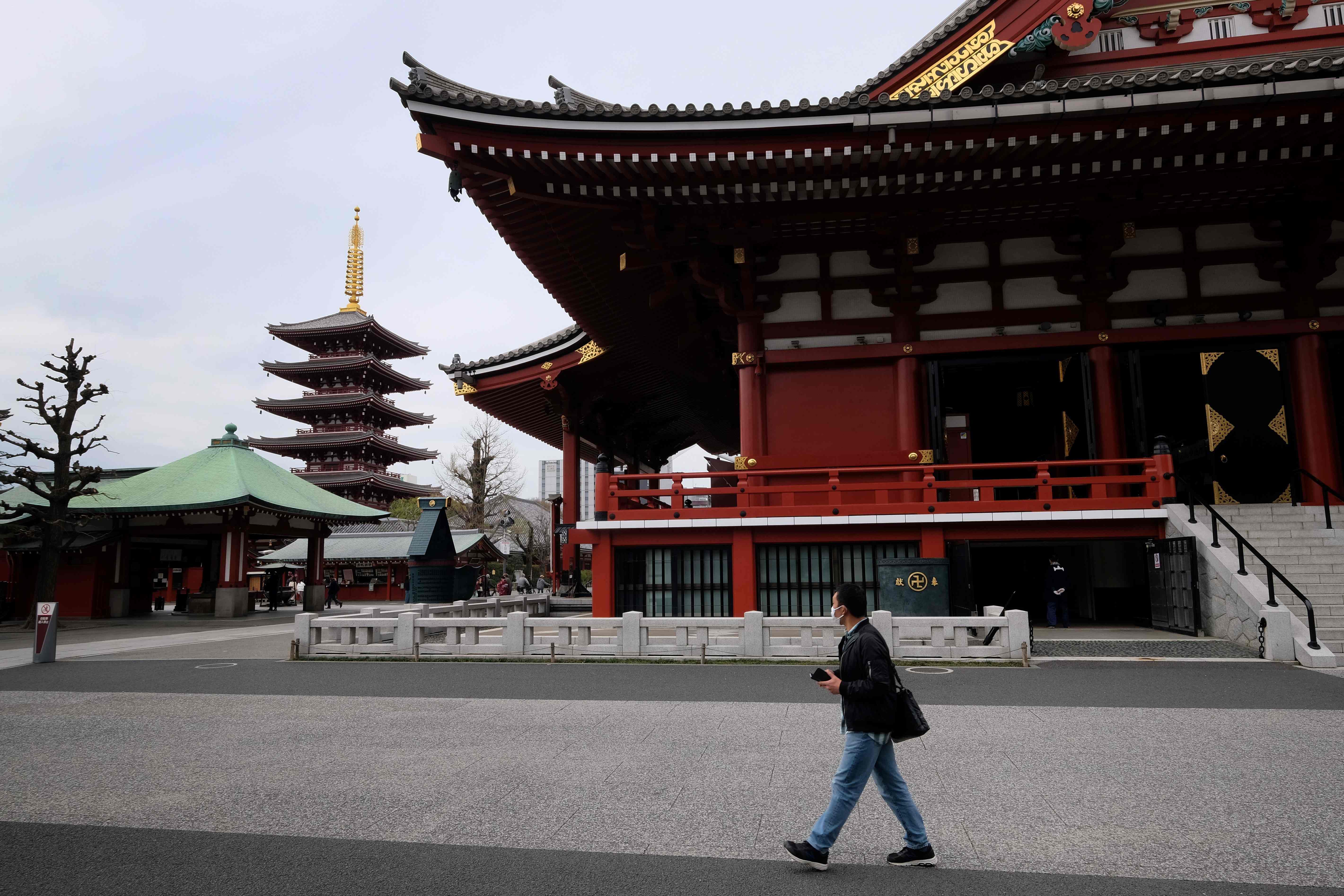At the time when 443 cases of Covid-19 were identified in Tokyo, the capital officially became the first epidemic center of Japan. Public schools and closed museums, absent tourists and transport a little less crowded than usual, the city operates in slow motion. But it is not completely dead, since many traders still greet their customers with masks on their noses.
Read also: Japan fears coronavirus outbreak
A new daily
The famous pedestrian crossing of Shibuya, empty during the epidemic. ISSEI KATO / REUTERS
For Céline and Alain, expatriates in Tokyo for 5 years, the landscape suddenly became much calmer. " There are fewer people on the streets and there are especially no tourists! " Exit therefore the swarming of the stations and the congested streets, the Sensô-ji temple lost its flood of visitors and the famous pedestrian crossing of Shibuya does not shine more than at rush hour.
With the reduction of public transport schedules and the measures taken by companies to promote telework and avoid congestion, trains and subways are no longer as crowded as before. " My last public transit outing was twelve days ago," continues Alain, who now benefits from teleworking. “There were fewer people, but not that much. "
The car windows are now open for ventilation. This is the first time I have seen this in Tokyo!
Remi Kitabayashi, dentist in TokyoLike this French couple, many Tokyoites are trying to reduce their travel. " There are still people who take the Shinkansen [high speed train, editor's note] to travel outside the city " complains in a half word Remi Kitabayashi, dentist in the very chic district of Omotesando, " but overall the people avoid because they are afraid . " However, for those like her who have no choice but to take transport to work, Tokyo Metro has found a system that makes people smile. “ The car windows are now open for ventilation. This is the first time I have seen this in Tokyo! "
Museums closed but shops open
Against all expectations, Ikea will open its doors to Harajuku in the midst of a coronavirus epidemic. Ikea
While some are self-censored, others continue to enjoy urban life. Museums and tourist spots like Tokyo Tower and Disneyland closed until mid-April, but restaurants and other small businesses remain open. " There are fewer customers than usual, but restaurants and gyms continue to run ." For Saito Imura, manager of a konbini (24-hour convenience store) in the south of the city, there is no question of closing the shop. “ The virus does not change anything in our functioning except that wearing a mask is now compulsory. There are only slightly fewer customers. Even if we adopt a more strict confinement, we will remain open ”.
Where some stores are now closing a few hours earlier, shopping centers and large chains such as Lumine or Parco also continue to open their doors. Ikea, which was planning to open a boutique in the Harajuku shopping district on April 25, has still not pushed back its launch date.
SOS travel agencies in distress
Since the entry ban on nationals of 24 foreign countries, Haneda airport has only received a handful of travelers. KAZUHIRO NOGI / AFP
Unlike businesses, the leading figures in tourism in Japan are hit hard by the drastic decrease in the number of foreign travelers. Mass cancellations in hotels and travel agencies, air staff forced to stop: for Aurélie, French "travel consultant" on the capital, it is the blow. “ The travel business I work for suffers considerable losses. Every day we receive dozens of requests for cancellations or postponements ”.
Read also: Coronavirus: exchange or cancel tickets, the different options for travelers
According to the latest statistics from the JNTO (National Tourist Office in Japan), the country would have experienced a drop in visits of more than 29% in January and February compared to last year. For a market estimated at $ 41.1 billion, the economic repercussions are already being felt. “ A first wave of layoffs and a 20% drop in wages were first carried out. As these measures were not sufficient, a new wave of layoffs was carried out, ”deplores Aurélie, on unpaid leave.
Fortunately all is not black in the country of Japanese tourism! And some hotels in the city are still able to hold their own by offering stays at reduced prices to their Japanese customers. Like some hotels in Ueno and Asakusa, which have lowered their prices by 20% on average on the online reservation site Rakuten Travel.
Towards a stricter confinement?
Despite the non-compulsory confinement requested by the authorities, the cafes still find customers in Tokyo. Le Figaro / Phoebe Leroyer
Are we moving towards compulsory containment of the Tokyoites? This Saturday, March 28, Prime Minister Shinzo Abe judged the " critical situation " but " not yet to the point of having to take containment measures ". The governor of Tokyo, Yuriko Koike, had shortly before invited residents to non-mandatory confinement over the weekend. For the occasion, the traditional gardens and department stores have closed. The first will remain closed until April 12, the major brands have reopened their doors on Monday morning. To the chagrin of certain Tokyoites like Céline. " It looks like a bad joke!" Weekend confinement and return to normal on Monday ?! "
Faced with the discovery of 68 new cases at the start of the week, the governor reiterated her request for voluntary confinement. A curfew, which is also not compulsory, is now recommended on weekday evenings, frequenting izakaya (traditional bars) and karaoke is suspected of being the source of around thirty contaminations.

